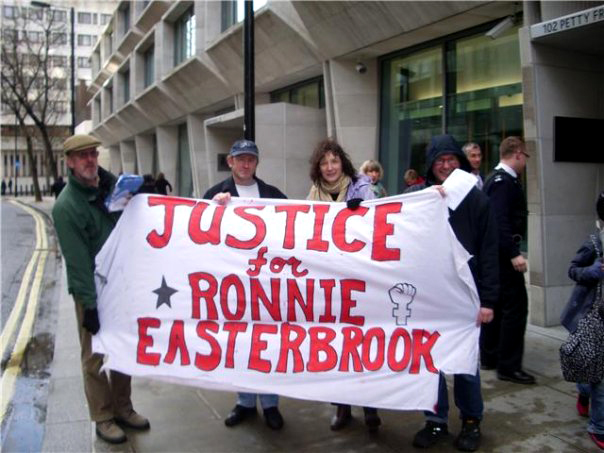 On 22 September the inquest into the death in prison of Ronnie Easterbrook took place. Ronnie died on 10 May 2009 in Gartree prison, the day before his 78th birthday, following a prolonged hunger strike, the last in a long series of protests over the 21 years he spent in prison. At the time of his death Ronnie weighed just 6st 3lb. The inquest jury found that he died from pneumonia brought on by his refusal to eat food, adding ‘he took his own life as a result of deliberate self-starvation’. After the inquest Ronnie’s nephew John Barden told the press he thought Ronnie should receive an apology from the government.
On 22 September the inquest into the death in prison of Ronnie Easterbrook took place. Ronnie died on 10 May 2009 in Gartree prison, the day before his 78th birthday, following a prolonged hunger strike, the last in a long series of protests over the 21 years he spent in prison. At the time of his death Ronnie weighed just 6st 3lb. The inquest jury found that he died from pneumonia brought on by his refusal to eat food, adding ‘he took his own life as a result of deliberate self-starvation’. After the inquest Ronnie’s nephew John Barden told the press he thought Ronnie should receive an apology from the government.
FRFI first came into contact with Ronnie in 1995 when he was in the segregation unit of HMP Whitemoor. Housed with Irish Republican prisoners protesting to demand repatriation to Ireland, Ronnie, who was then 64 and had already lost the use of one lung on a previous prison sentence, was on a dirty protest to draw attention to his wrongful conviction.
He had been arrested for participating in a failed armed robbery that was deliberately set up by a police informer. At his trial when his barrister would not agree to argue that the ‘shoot-to-kill’ policy being used by British forces in Ireland was now being used in England, Ronnie ended up defending himself. He became the only person in Britainnot convicted of murder to be sentenced to a life sentence with no parole. Following an appeal his tariff (minimum term) was eventually reduced to 12½ years; however lifers can only be released once the Parole Board determines they are no longer dangerous. Ronnie was not interested in parole – only in a retrial at which the actions of the police could be re-examined.
Ronnie was supported by many prisoners who respected his uncompromising attitude. Outside prison he was supported by comrades from FRFI, Anarchist Black Cross and MOJUK. Together with a small group of loyal friends and relatives, we wrote letters of complaint to the Prison Service and demonstrated outside the Home Office. Many of us met up at Ronnie’s funeral, where other family members and former prisoners, who had not seen him for many years, also paid their respects.
‘Ronnie was an inspiration to everyone who knew him and I took comfort in knowing that he was one of the few staunch, loyal and wholly dependable guys one could ever meet in the system.’ Charles Hanson, former prisoner.
‘It is with great sadness that I learnt of Ronnie’s death or is this murder? He was such a fighter and I had a lot of respect for him – he would never compromise his beliefs and because of that he suffered in jail. He was courageous and I sincerely hope he is now at peace.’ Sue May, former wrongfully convicted prisoner.




